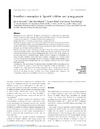Please use this identifier to cite or link to this item:
https://accedacris.ulpgc.es/jspui/handle/10553/44859
| Title: | Breakfast consumption in Spanish children and young people | Authors: | Aranceta, Javier Serra-Majem, Lluís Ribas, Lourdes Pérez-Rodrigo, Carmen |
UNESCO Clasification: | 32 Ciencias médicas 3206 Ciencias de la nutrición |
Keywords: | Breakfast Children´s food habits Food patterns Nutrition surveys |
Issue Date: | 2001 | Journal: | Public Health Nutrition | Conference: | 4th Congress of the Spanish-Society-of-Community-Nutrition (SENC)/3rd International Workshop of Community Nutrition | Abstract: | Background and objectives: Breakfast consumption is important for nutritional balance in all population groups. The objective of this paper is to describe breakfast consumption patterns in Spanish children and young people.Design: Random population cross-sectional nutritional survey.Methods: A random sample of 3534 people aged 2 to 24 years were interviewed by a team of 43 dietitians. The protocol included 24-hour recalls (a second 24-hour recall in 30% of the sample), a food-frequency questionnaire and other questions including lifestyles, knowledge and food preferences.Results: Participation rate in the survey was 68%. Of the boys, 91.2% and 92.2% of the girls in the sample usually had breakfast. Mates aged 18 years and above and 14-17-year-old girls showed the lowest consumption rates. Some 4.1% of the sample did not have any food at all before lunch. Main sources of energy with breakfast were milk and dairy products (34%) and buns, cookies, croissants, etc. (24.6%). Some 44.7% of the sample was classified in the poor-quality breakfast group. Subjects from a low socio-economic background and low educated parents had lower Quality Breakfast Score.Conclusions: The proportion of children having breakfast before attending school has increased in Spain in recent decades. However, intake of breakfast is not adequate in a large proportion of this population and a number of children and young people still do not eat anything before lunch. School-based nutrition education involving families, teachers and health professionals, supported by community actions, can contribute to improve this situation. | URI: | https://accedacris.ulpgc.es/handle/10553/44859 | ISSN: | 1368-9800 | DOI: | 10.1079/PHN2001235 | Source: | Public Health Nutrition [ISSN 1368-9800], v. 4, p. 1439-1444 |
| Appears in Collections: | Actas de congresos |
Items in accedaCRIS are protected by copyright, with all rights reserved, unless otherwise indicated.
